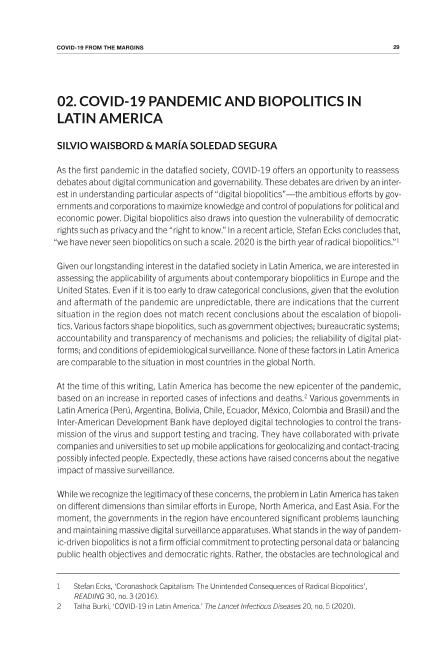Mostrar el registro sencillo del ítem
dc.contributor.author
Waisbord, Silvio Ricardo

dc.contributor.author
Segura, Maria Soledad

dc.contributor.other
Milan, Stefania
dc.contributor.other
Treré, Emiliano
dc.contributor.other
Masiero, Silvia
dc.date.available
2021-06-04T12:41:00Z
dc.date.issued
2021
dc.identifier.citation
Waisbord, Silvio Ricardo; Segura, Maria Soledad; COVID-19 pandemic and biopolitics in Latin America; Institute of Network Cultures; 2021; 29-32
dc.identifier.isbn
978-94-92302-72-4
dc.identifier.uri
http://hdl.handle.net/11336/133207
dc.description.abstract
Given our longstanding interest in the datafied society in Latin America,we are interested in assessing the applicability in the region ofarguments about contemporary biopolitics in Europe and the UnitedStates. Even if it is early to draw categorical conclusions giventhat we are in the middle of the pandemic and its evolution andaftermath are unpredictable, there are indications that the currentsituation in the region does not match recent conclusions about the escalation of biopolitics. At the time of this writing, Latin America has become the new epicenterof the pandemic (Burki 2020) with growing number of reported cases ofinfections and deaths. Various governments in Latin America (Perú,Argentina, Bolivia, Chile, Ecuador, México, Colombia and Brasil) andthe Inter-American Development Bank have deployed digitaltechnologies to control the transmission of the virus and to supporttesting and tracing. They have collaborated with private companiesand universities in setting up mobile applications for geolocalizingand contact-tracing possibly infected people. Expectedly, theseactions have raised concerns about the negative impact of massivesurveillance.However,while we recognize the legitimacy of these concerns, the problem inLatin America takes different dimensions than in Europe, NorthAmerica, and East Asia. For the moment, the governments in the regionhave significant problems to launch and maintain massive digitalsurveillance apparatuses. What stands in the way of pandemic-drivenbiopolitics is not a firm official commitment to protecting personaldata or to balancing public health objectives and democratic rights.The obstacles are rather technological and institutional, namely,poor reach and limited effectiveness of digital and mobiletechnologies as well as deep-seated problems of state performance interms of governmentality and the provision of health services in theregion.
dc.format
application/pdf
dc.language.iso
eng
dc.publisher
Institute of Network Cultures
dc.rights
info:eu-repo/semantics/openAccess
dc.rights.uri
https://creativecommons.org/licenses/by-nc-sa/2.5/ar/
dc.subject
COVID-19 pandemic
dc.subject
biopolitics
dc.subject
resistance
dc.subject
COVID-19
dc.subject.classification
Ciencias Sociales Interdisciplinarias

dc.subject.classification
Otras Ciencias Sociales

dc.subject.classification
CIENCIAS SOCIALES

dc.title
COVID-19 pandemic and biopolitics in Latin America
dc.type
info:eu-repo/semantics/publishedVersion
dc.type
info:eu-repo/semantics/bookPart
dc.type
info:ar-repo/semantics/parte de libro
dc.date.updated
2021-06-03T14:45:11Z
dc.journal.pagination
29-32
dc.journal.pais
Países Bajos

dc.description.fil
Fil: Waisbord, Silvio Ricardo. No especifíca;
dc.description.fil
Fil: Segura, Maria Soledad. Consejo Nacional de Investigaciones Científicas y Técnicas. Centro Científico Tecnológico Conicet - Córdoba; Argentina
dc.relation.alternativeid
info:eu-repo/semantics/altIdentifier/url/https://networkcultures.org/blog/publication/covid-19-from-the-margins-pandemic-invisibilities-policies-and-resistance-in-the-datafied-society/
dc.conicet.paginas
282
dc.source.titulo
COVID-19 from the margins: invisibilities, policies and resistance in datafied societies
Archivos asociados
